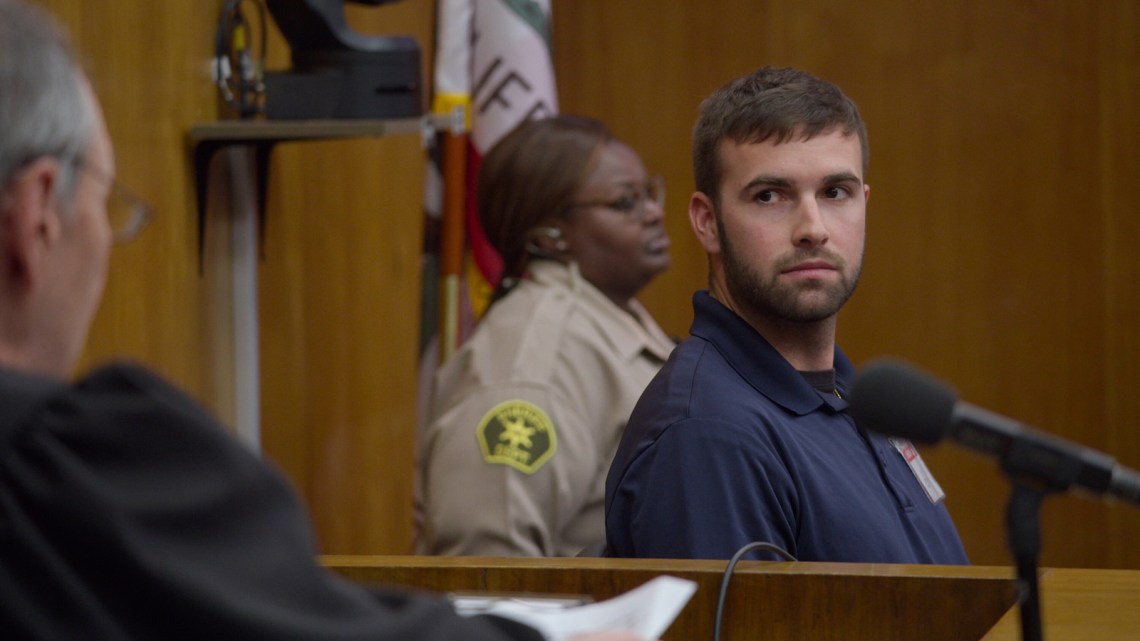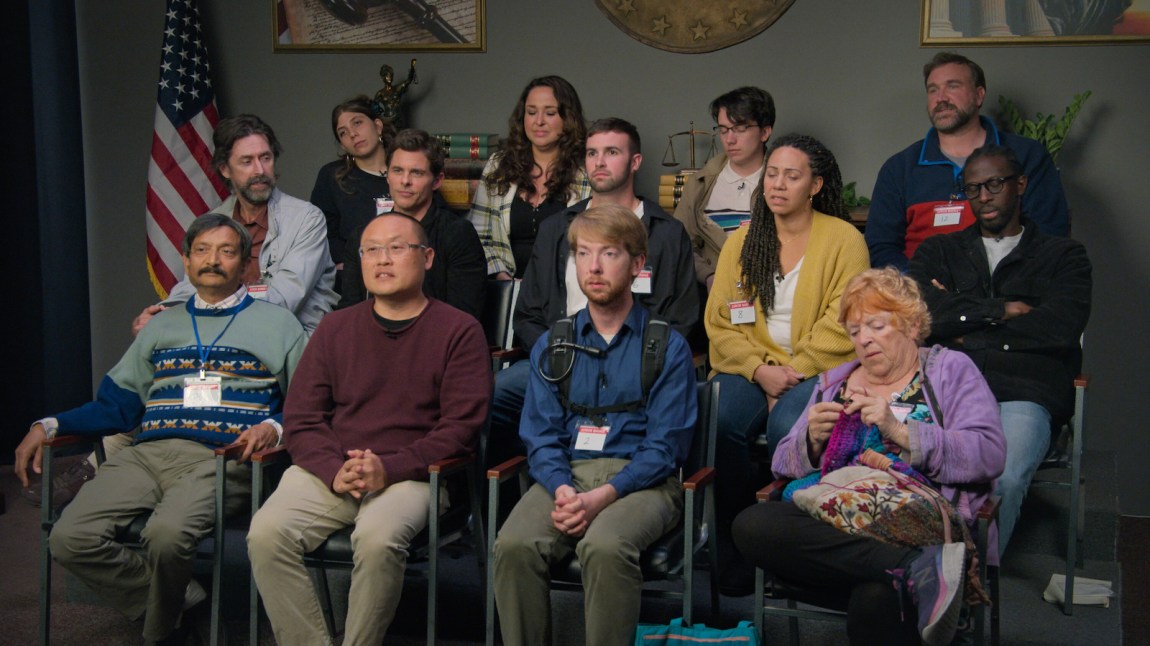Two years ago, a production company posted an ad on Craigslist seeking subjects for a documentary about jury duty. One of the thousands of people who responded was a thirty-year-old solar panel contractor named Ronald Gladden. He showed up at a Los Angeles courthouse, was chosen for the jury, and for three weeks sat on a trial and stayed in a hotel with thirteen other jurors and no Internet. The case they saw was low stakes but chaotic—a civil suit in which lawyers fumbled, video evidence glitched, and furniture tipped. That none of this was real was only revealed to Gladden after the trial ended, when he learned the courthouse had been a set and everyone around him paid actors.
The dupe is the conceit of Jury Duty, a TV show created by Lee Eisenberg and Gene Stupnitsky, known for writing on The Office, and nominated for this year’s Emmy Award for Outstanding Comedy Series. Like The Office, the show is in the style of a documentary with talking head interviews and winsome humor. It essentially plunks Gladden in a sitcom to see how he’ll react. “When they say ‘jury of your peers,’ I think that’s accurate,” he says at the start of the first episode. At six foot six, with a broad smile, crew cut, and a black polo from American Eagle, Gladden has the affect of a prom king from the mid-2000s. His generic good looks and calm demeanor make him the perfect straight man to the eccentrics who serve alongside him in the jury. They include a raspy narcoleptic, a raunchy flirt who steals Twix bars, an inventor who preaches transhumanism in halting upspeak, and the actor James Marsden, playing himself.
The show’s eight episodes are structured around a trial involving an eco-conscious clothing company called Cinnamon and Sparrow, owned by a woman named Jacqui (pronounced “Jack-wee”). She claims that one of her employees drunkenly printed the word “JORF,” a fake white supremacist slogan, on tee shirts before falling asleep and peeing on them. Jacqui is suing for financial losses and damage to her business’s reputation, which she describes as having been, before the incident, “beyond reproach.”
Everything about the case is wrong. The jurors sleep during testimony, clap in court, and run blenders in the jury room. A witness testifies that Jacqui “beefed it pretty hard.” Another is revealed to have publicly masturbated to the movie Pacific Rim Uprising. In one of the finest scenes, the defense attorney plays an animated video of his client’s version of events. The defendant’s avatar, disjointed and two-dimensional, has spikes of color shooting out from its head. The cartoon’s legs get stuck and the body stretches long, its pixels flickering and jerky. Then the video ends. “That’s the whole thing?” the judge asks. “Unfortunately, yes,” the attorney tells him. Though the show’s second half is duller and less surprising, the first few episodes have much to marvel at: well-scripted jokes that would be funny if Gladden weren’t there and are terrific because he is, scrunching his forehead in the jury box. His wide eyes and bemused smile are punchlines to the trial’s many absurdities.
Those facial gestures are as close as Gladden gets to passing judgment. The man is unflappable. When James Marsden asks him for help with an audition, they run overwrought lines for what seems to be hours, and Gladden gracefully accepts notes on his own acting. (“I think you can be a little more delicate and make it, if you can, a little less casual,” Marsden instructs him.) He agrees to take the blame for a toilet that Marsden clogs, and doesn’t flinch when asked for sex advice by a virginal juror, who also makes him talk to his girlfriend on the phone. Even the inventor, Todd, whose personality was designed to frighten Gladden, can’t get a rise out of him. When Todd passes a note under his door that proposes a way to communicate (“1 knock = I’m awake / 2 knocks = I’m going to bed / 3 knocks = I have leftover food if you’d like any”), Gladden writes back: “Works for me. Let me know if you need anything.” Rather than snickering at Todd for wearing a contraption to court that he calls chair pants, or “chants,” Gladden shows him the movie A Bug’s Life, about an ant who is inventive and misunderstood.
Gladden’s decency does not go unnoticed. After he announces the jury’s verdict, the judge asks him to sit in the witness box. He tells Gladden that the case was fake but that “there was most definitely a trial held inside this courthouse.” Gladden was “presented day after day with countless challenges, responsibilities, and ethical dilemmas,” he continues. “We’ve considered all the evidence presented during your trial, and we’ve decided that you, Ronald Gladden, are a hero.” The show awards him $100,000.
Advertisement
*
Almost always made by and with men, prank shows can’t help but shed light on their fears, foibles, and preoccupations. These shows are incidental portraits of American masculinity. In Nathan For You, Nathan Fielder concocts harebrained schemes to help ordinary people, most of them small business owners. He lends a hand to a lecherous Bill Gates impersonator seeking a lost love, a mall Santa who needs work in warm months, and a dog trainer who says about his last relationship: “she married her ex-boyfriend, and, uh, I’m in LA training dogs.” Santa Claus in summertime is a pretty good metaphor for the men on Fielder’s show: desperate to stay relevant.
A more pointed project is Sacha Baron Cohen’s Who Is America?, to which Fielder contributed as a writer and director. Cohen—disguised as a balding NPR liberal, a muscle-bound Israeli terrorist fighter, and a Trumpy conservative—gets right-wing politicians and gun nuts to drop their niceties. Dick Cheney laughs when Cohen says he once waterboarded his wife. Two sitting Republican congressmen lauds a proposal for a program that would train preschoolers to shoot guns. Chip Limestone, a former South Carolina state legislator, shifts in his chair when Cohen says a man once made love to him. “Don’t get too close,” Limehouse says.
By catching people off guard, an effective prank can do what reality television purports to do: show us how they really behave. But where Fielder finds quiet desperation and Cohen hysterical bigotry, what we discover behind Gladden’s affable appearance is more affability. Jury Duty was written as a warmhearted and uplifting hero’s journey, with Gladden perfectly cast for the part. “He is such a nice guy. He’s funny, he’s charming, he’s witty. That’s what we had hoped for,” Eisenberg has said. In a genre that often makes you worry about the people you’re seeing—including the pranksters themselves, who seem to mire in the misery of others in order to escape their own—this show reassures that, deep down, the men are all right.
It has fed into a frenzy for good guys. At the Emmys, Jury Duty will go head to head with Ted Lasso, about an American coach who brings hokey cheer to an English soccer team, for best comedy. Ted and Ronald, as white, attractive, cis, able-bodied men, occupy a status of privilege that has deservedly gotten more scrutiny and scorn in popular culture. Instead of studying their flaws, it is a relief to find men who can be celebrated without apology. Gladden has the bonus of being real. “You are such a good person,” Kelly Ripa cooed to him on her morning show. One critic wrote that he may be “the best human on the planet,” and another that he might be the “nicest man alive.” In a Mint Mobile commercial with Ryan Reynolds, Gladden is labeled “An All-Around Good Guy.” It is an ironic byproduct of feminist awareness that men who buck the trend of toxicity are championed so loudly. We have circled all the way back around to worshiping the Everyman. Gladden put it best. “I’m being labeled as a hero,” he said in a promotional interview with Amazon News. “I’m flattered, but it feels like a weird title, because if you look at what I did on a day-to-day basis, all I was trying to do was just be a decent human being.”
It’s fitting that the show takes place in the fictional trial of a low-life white man, Trevor. The defendant’s own mother, with whom he lives, testifies that he can’t hold a job, doesn’t pay rent, and leaves their home a mess. A perfect foil for clean-cut Ronald, Trevor is sued, essentially, for being a deadbeat—getting high on the job and soiling company product. Marsden, who plays a cocky and preening version of himself, also exaggerates what Gladden is not. Gladden is venerated for being unlike these men and also for seeing the goodness in them. He befriends Marsden and leads the jury to decide that, though Trevor did ruin the tee shirts, he wasn’t negligent in doing so. Not all men are bad, the show suggests. Or, at least, they’re not all bad.
By making Gladden look so good, the show’s creators avoid the obvious charge that they did something wrong. While other shows that manipulate nonactors under false pretenses are typically met with both disgust and admiration, this one has skipped scrutiny and gone straight to acclaim. This is due, almost entirely, to casting. That nothing riles Gladden up extends to the fact that he was, for three weeks, lied to and filmed by hidden cameras. In interviews he has said that after the big reveal he felt paranoid, feared he was being followed, and took time off from work to recover from the experience. Even so, he claims he wasn’t angry: “Everyone asks me if there was ever an instance when I was mad, and I’ve been telling them ‘no.’”
Advertisement
Yet just as the show’s self-justification is precarious, so is the standard it makes Gladden uphold. When asked if he felt any stress about living up to his reputation, he said “I can’t get road rage anymore, that’s for sure. I can’t yell at people anymore. That’s the only frustrating thing.” Jury Duty has trapped Gladden inside a two-dimensional television-character version of himself—a good-natured Jim Halpert who never raises his voice. What allows the show to go down more easily than its darker-hearted reality show counterparts is that it is, in form and substance, a sitcom. Where Fielder incorporates doubt into his project—“What on earth was I doing?,” he asks in The Rehearsal—Jury Duty constructs a fake world where true conflict or anxiety, including about its own manipulations, have no place. Of course there is something wrong about the way this show uses deception and surveillance, and of course there is something wrong with Ronald, just as there is something wrong with us all. But Jury Duty doesn’t go there.




